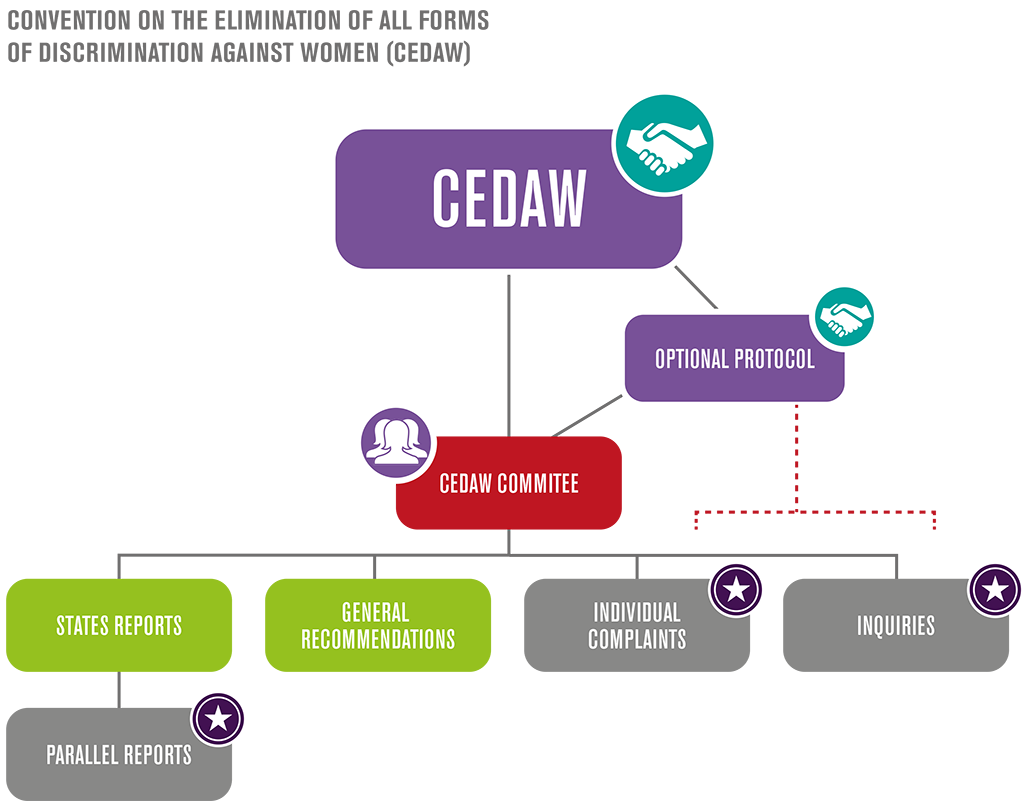



CEDAW | Optional Protocol | CEDAW Committee | States Reports | Parallel Reports | General Recommendations | Individual Complaints | Inquiries
At a glance
Treaty: Convention on the Elimination of All Forms of Discrimination against Women (CEDAW)
Entered into force: 3 September 1981
Optional Protocol: Optional Protocol to the Convention on the Elimination of All Forms of Discrimination against Women (OP-CEDAW)
Treaty Body: Committee on the Elimination of Discrimination against Women
Location: Geneva
Meetings: Three times a year
Reports to: General Assembly, through ECOSOC
States must report: within one year of accession or ratification of CEDAW and thereafter every 4 years or when the Committee requests
Has your state ratified it? CEDAW | Optional Protocol
Contact information:
Committee on the Elimination of Discrimination against Women
Human Rights Treaties Division (HRTD)
Office of the United Nations High Commissioner for Human Rights (OHCHR)
Palais Wilson – 52, rue des Pâquis
CH-1201 Geneva (Switzerland)
Mailing address
UNOG-OHCHR
CH-1211 Geneva 10 (Switzerland)
Tel. +41 22 917 94 43 | Fax +41 22 917 90 08
cedaw@ohchr.org
Convention on the Elimination of All Forms of Discrimination against Women: An “International Bill of Rights for Women”
Entered into Force: 3 September 1981
At the World Conference for the International Women’s Year in 1975 in Mexico City, a World Plan of Action was adopted to address gender inequality and discrimination. This Plan of Action called for the adoption of a convention on the elimination of discrimination against women. In 1979, with growing support around the world, the UN General Assembly adopted the Convention on the Elimination of All Forms of Discrimination (CEDAW) – the International Bill of Rights for Women. In its preamble, CEDAW recognises:
…discrimination against women violates the principles of equality of rights and respect for human dignity, is an obstacle to the participation of women, on equal terms with men, in the political, social, economic and cultural life of their countries, hampers the growth of the prosperity of society and the family and makes more difficult the full development of the potentialities of women in the service of their countries and of humanity…
Violence against women is both a cause and a consequence of discrimination against women and sustained gender inequality. Although violence against women was not directly addressed in the original text of the Convention, its absence can be explained by the general understanding of the issue during the drafting process and its later emergence in the international human rights arena (see Chinkin, Freeman and Rudolf’s commentary on CEDAW for further discussion on this). There are provisions within CEDAW, however, which relate to state obligation to address specific forms of violence against women (see, for example, Article 6 requires states to “take all appropriate measures [….] to suppress all forms of traffic in women and exploitation of the prostitution of women”) and have a direct impact on efforts to tackle it. The continued work of CEDAW’s treaty monitoring body, the CEDAW Committee, has also defined state obligation to end gender-based violence as part of the human rights guarantees laid out in the Convention. Today, CEDAW remains one of the most important instruments for tackling violence against women and securing women’s human rights.
![]() Want more? Read Christine Chinkin, Marsha Freeman and Beate Rudolf’s commentary on CEDAW
Want more? Read Christine Chinkin, Marsha Freeman and Beate Rudolf’s commentary on CEDAW
 CEDAW: By Article
CEDAW: By Article
- Part I (Art 1-6) defines discrimination and sets out obligations of a general nature
- Part II (Art 7-9) guarantees of equality in political + public life
- Part III (Art 10-14) guarantees of equality in social + economic fields
- Part IV (Art 15+16) guarantees of equality before the law and in marriage + family life
- Part V (Art 17-22) establishes CEDAW Committee and state monitoring mechanism | Part VI (Art 23-30) formal + procedural matters
Reservations: Article 28
According to the 1969 Vienna Convention on the Law of Treaties a reservation is (Article 2.1d):
…a unilateral statement, however phrased or named, made by a State, when signing, ratifying, accepting, approving or acceding to a treaty, whereby it purports to exclude or to modify the legal effect of certain provisions of the treaty in their application to that State.
Reservations allow a state to be a party to CEDAW while avoiding the legal effect of specific provisions. This happens when a state issues a formal statement at the time of signing, ratifying, accepting, approving or acceding to a treaty, indicating which particular provisions they are choosing not to be bound by. However, in this context, the term “purport” is important – there are some situations where states purport not to be bound to a particular provision of a treaty by entering a reservation, but the reservation is invalid, and therefore, not permitted. Following the guidelines set out in the Vienna Convention, Article 28 of CEDAW states:
1. The Secretary-General of the United Nations shall receive and circulate to all States the text of reservations made by States at the time of ratification or accession.
2. A reservation incompatible with the object and purpose of the present Convention shall not be permitted.
3. Reservations may be withdrawn at any time by notification to this effect addressed to the Secretary-General of the United Nations, who shall then inform all States thereof. Such notification shall take effect on the date on which it is received.
Reservations cannot be made to every provision of CEDAW. All reservations must be narrow, specific and consistent to ensure they do not contradict the overall object and purpose of CEDAW. The CEDAW Committee has issued statements on the permissibility of states’ reservations to specific articles. For example, some states parties to CEDAW have stated that their laws relating to male succession of royal or aristocratic titles are not subject to CEDAW’s equality provisions, and this kind of reservation has been broadly accepted. However, other states have tried to reject entire articles within CEDAW, such as the right to equality in the family (Article 16) – which the CEDAW Committee has not allowed. This is because the CEDAW Committee has emphasised that, whether requested for national, traditional, religious or cultural reasons, reservations denying gender equality within the family are incompatible with CEDAW’s object and purpose, and therefore are impermissible.
![]() Want more? Read Marsha Freeman’s “Reservations to CEDAW: An Analysis for UNICEF”
Want more? Read Marsha Freeman’s “Reservations to CEDAW: An Analysis for UNICEF”
Optional Protocol to the Convention on the Elimination of All Forms of Discrimination against Women
Entered into Force: 22 December 2000
The Optional Protocol to CEDAW (OP-CEDAW) is a treaty that was developed to complement CEDAW. OP-CEDAW strengthens the CEDAW Committee’s procedures for addressing violations of women’s rights by establishing two specific mechanisms: a complaints procedure and an inquiry procedure.
As a human rights treaty itself, states parties to CEDAW must separately ratify or accede to OP-CEDAW to be bound by its provisions. As of 7 June 2016, 107 states are party to the Optional Protocol to CEDAW (OP-CEDAW). This means 82 states who have agreed to be bound by CEDAW have yet to accept the additional mechanisms – a complaints procedure and inquiry procedure –designed to support its implementation.
Use the links located on the right hand sidebar (or, for mobile users, at the bottom of this page) to learn more about the Convention on the Elimination of All Forms of Violence against Women and the Committee that oversees its implementation – as well as how civil society can engage with its work.
Icon Key




